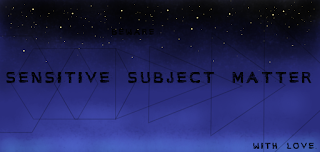(Health) C-PTSD: Complex Post-Traumatic Stress Disorder
Hello everyone! I've been trying to produce a video on this topic, but knowing that it is such a difficult one to dispense information on thoroughly and accurately, I think I'll start by making a blog entry about it first!
C-PTSD or Complex Post-Traumatic Stress Disorder is similar to regular PTSD in the sense that it is lasting psychological damage from enduring a hardship or traumatic experience like abuse, a disaster, a violent crime, but is considered complex because a) the circumstance is different, often consisting of more time in the situation, with pain coming in different forms from different people/places and thus b) effecting the individual in a deeper, more impactful way than a shorter-lived, one-time episode of trauma which results in normal PTSD. I know, it's a quite a bit to understand.
The types of situations that can cause someone to develop this disorder are as follows, but not limited to:
- childhood/domestic abuse
- severe bullying throughout school
- serving in the military, engaging in combat
- abusive scenarios involving drug use
- prostitution
- torture
- severe neglect
- homelessness
- other types of continual exposure to inhumane conditions
Some of the comorbid disorders with C-PTSD are:
- anxiety
- depression
- ASPD (Anti-Social Personality Disorder, or sociopathy)
- substance abuse
- psychosis
- suicidal behavior
- miscellaneous presentations of cluster personality disorders (borderline, schizoaffective, schizoid, avoidant, etc.) which are all developed as coping mechanisms for what feelings the individual experiences
Flashbacks are major part of both C-PTSD and PTSD. Flashbacks are essentially lengths of time where the painful memory floods back into the sufferers mind, causing them to relive [part of] the traumatic experience they endured. People around them might be able to recognize this when they see them acting "bizarre", confused, afraid, panic-stricken, crying, yelling, hiding, running, or even acting out the event. Some ex-militant persons have been known to act as though they are engaging in weapons combat. The best thing to do in these types of scenarios as loved one is to firstly, try your best to remain calm, and know that it will be over soon. Next, try to help them feel grounded or safe. It is not advisable to touch or move them without their direct permission to do so. Depending on the situation, touching them can sometimes exacerbate the condition. Try to talk soothingly to them and reassure them that they are in a safe place now, and that you love and care for them. Depending on how trusting they are toward you, it may take a while to get them cooled down.
As a friend or family member, it is good to try to remain empathetic. Sometimes we say or do things that are normal to us, but triggering to their episodes. Sometimes it happens, and that's okay. It's worth forgiving. You didn't mean to.
Some things I try to take into account is not to bring up harsh subjects too soon around people I don't know well, and being kind of a goth kid, I try not to wear my combat boots somewhere if I know there are going to be veterans. I don't know if that's a real issue for them or not, but I think it's courteous at least.
If you'd like to read additional some additional resources, they are here. There is also information for a crisis hotline if anyone is in danger. Please don't be afraid to reach out if you need help or anything. There's nothing wrong with that.
https://www.thrivetalk.com/cptsd/ (There are hotline numbers at the end of this article)
https://www.healthline.com/health/cptsd
https://www.mentalhelp.net/articles/ptsd-hotline/


Comments
Post a Comment